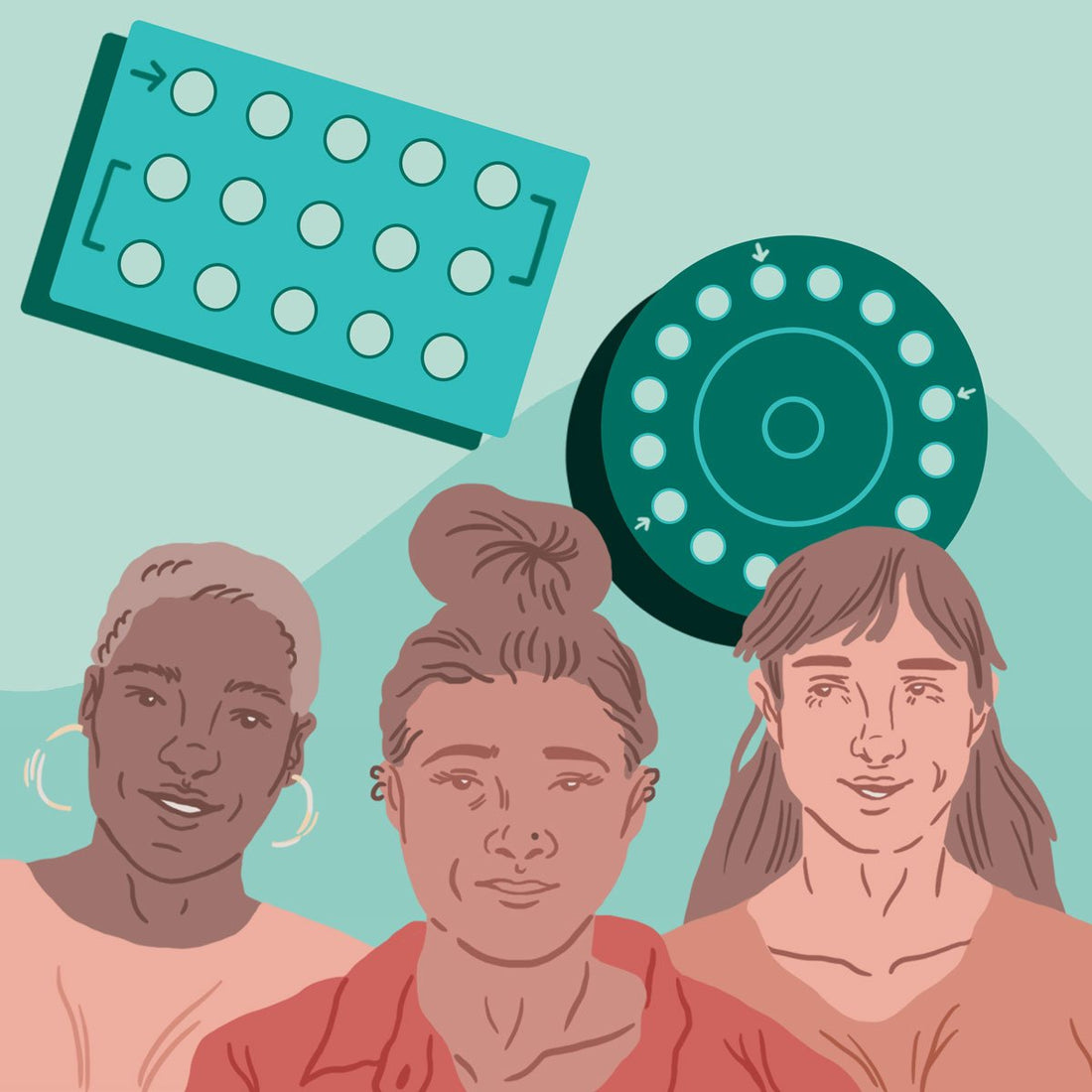The pill, also known as “oral contraception,” is a tiny pill taken at the same time every day. The first birth control pill was approved by the FDA in 1960, thanks to Margaret Sanger's activism and Katherine McCormick’s financial support. Not only is it 99% effective with perfect use, the pill sparked the sexual revolution and has helped women live life on their own terms for nearly 60 years!
Ok, but what is the pill exactly?
Birth control pills contain the hormones estrogen and progestin. Estrogen and progestin prevent the body from releasing an egg for fertilization every month. The hormones also thicken the cervical mucus to prevent sperm from reaching an egg. There are two different types of pills: combination and progestin-only. Different pills can have different levels of hormones over the course of a month.
“Monophasic” pills provide an even amount of hormones throughout the month whereas other pills have varied hormone doses throughout the month. This is most commonly three doses in “triphasic” pills. The phasic pills were designed to help with side effects, especially bleeding, but it is unclear if this has been the case. Monophasic and triphasic pills have the same level of efficacy.
Different brands of monophasic pills can also vary based on the amount of hormones they contain so sometimes your doctor may go to higher or lower doses based on your symptoms.
How effective is it?
The pill is 91% effective with typical use. With perfect use, the pill’s effectiveness shoots up to over 99% effective! “Perfect use” means taking the pill at the exact same time every single day (no missed doses!)
What are the side effects?
Some women experience positive side effects, some experience negative side effects, and some do not have any side effects at all! Not everyone has the same experience with the pill. And to complicate things further—sometimes women experience different side effects with different types of pills. Below, we list the most commonly reported side effects. But remember, it is important to listen to how your own body feels on the pill!
The good:
- Can help with cramping
- Can improve acne
- Regulates menstrual cycles
- Lighter periods
- Offers ability to control the timing and length of your period
- Offers protection against anemia and ovarian cysts
- Helps control polycystic ovary syndrome and endometriosis
The not-so-good:
- Spotting
- Headaches
- Nausea
- Breast tenderness
- Bloating/Increased appetite
- Slightly increased risk of blood clots while on the pill
The random:
- Some women experience weight gain or weight loss, but most experience no fluctuation in weight
- Can increase or decrease libido
- Most women experience a slight improvement in mood or no change at all, but a few have reported feeling down while on the pill
Any long-term benefits?
- Reduces risk of endometrial cancer.
- Reduces risk of ovarian cancer.
- Reduces risk of colorectal cancer.
Any long-term risks?
Unclear. There may be a slightly increased risk of breast cancer or cervical cancer but the data is mixed. When thinking about cervical cancer, it is important to note the difference between correlation and causation. Cervical cancer is caused by HPV, a sexually transmitted virus, that is passed along through unprotected sex.
The rates of unprotected sex are higher among women using the pill, which is likely correlated with the slight increased risk of cervical cancer. So in addition to preventing pregnancy with the pill, condoms should be used to protect against STIs.
What do the different brands mean?
No brand of pill has been shown to be more effective than any other when it comes to efficacy. There’s typically no medical reason to use an expensive name-brand pill. If you have a large copay, talk to your doctor to see if there is a generic equivalent that has the same level of hormones is a good option for you. Online telemedicine providers like Twentyeight Health make it easy to use your insurance and find options as low as $0 copay and offer affordable options as low as $18 per month if you don’t have insurance.
What are some common myths about the pill? Is there any truth behind them?
MYTH: “The pill causes infertility.” The pill does not cause infertility. Many years of research demonstrate that most women return to fertility immediately after stopping the pill. Also, the data shows that women who took the pill get pregnant after stopping the pill just as quickly as women who did not use any form of hormonal birth control.
MYTH: “The pill causes abortions.” The pill does not cause abortions. Once an egg is fertilized and implanted in the uterus, the pill will not affect the pregnancy. Research has shown that taking the pill doesn’t even harm a developing fetus.
MYTH: “The pill is not as effective when I’m taking antibiotics.” Commonly prescribed antibiotics have no effect on the pill. The only antibiotic that interferes with the pill is rifampin (Rifadin), a drug that treats tuberculosis. But your doctor will warn you about the reduced effectiveness before prescribing this medication.
Does it protect me against sexually transmitted infections?
It is important to remember that the pill does not protect against sexually transmitted infections (STIs), so a barrier method (external condom, internal condom, dental dam) should be used in addition to the pill.




















































